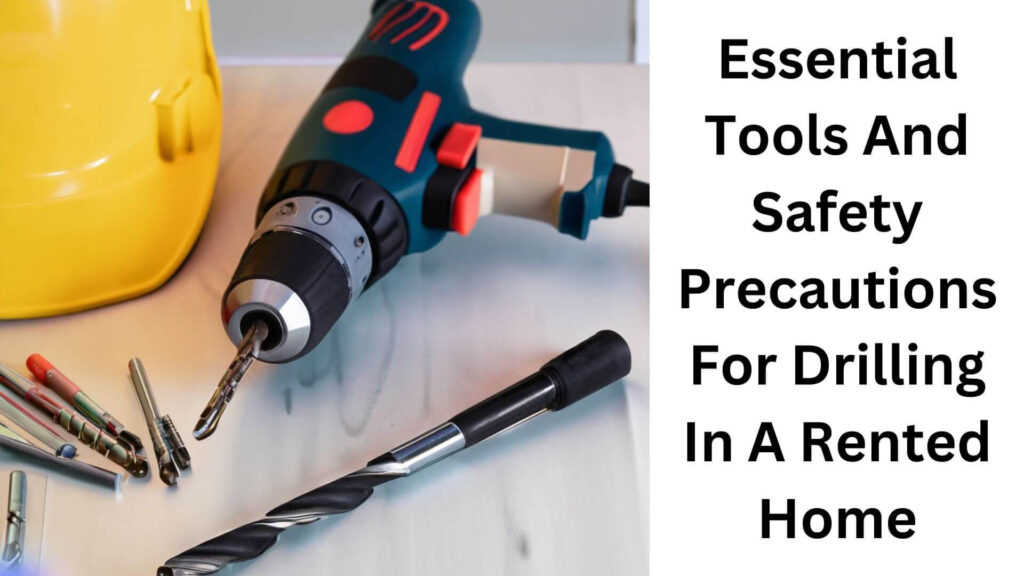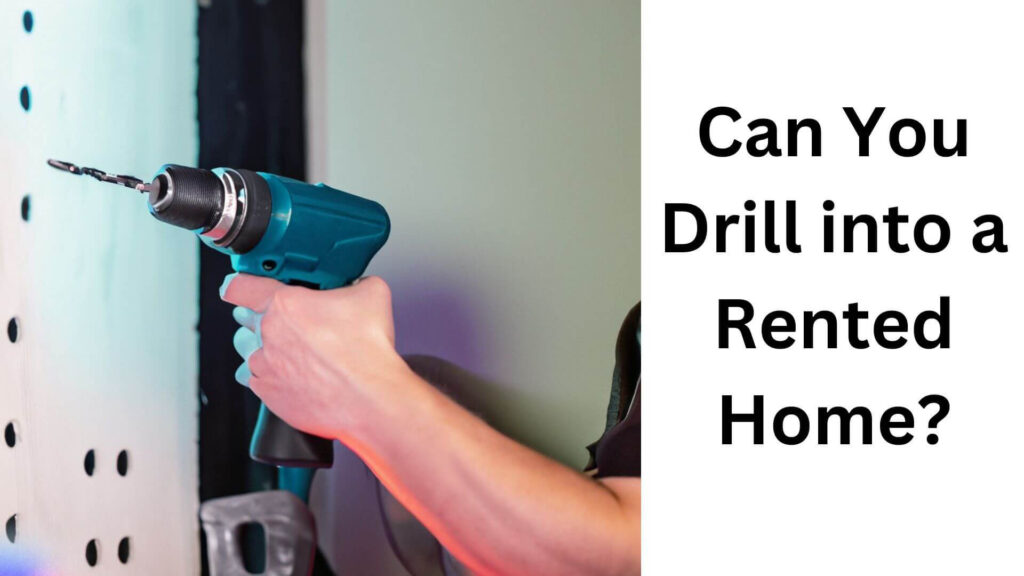As a renter, the question of whether or not you can drill into your rented home is common. For example, you may be looking to hang up artwork, install shelves, or even mount a TV, but the fear of damaging the walls or breaking your lease agreement can be overwhelming.
The truth is, can you drill into a rented home?
The answer is No; you can only drill into a rented home with the landlord’s permission. Therefore, it’s essential to respect the property and follow the terms of the lease agreement.
However, with the right approach and communication with your landlord, you can often modify your rental space without penalty or repercussion.
Follow these guidelines to avoid legal consequences and security deposit loss. As a renter, you may feel limited in changing your living space. It’s natural to want to personalize your home and make it feel more like your own.
In this article, I’ll explore the reasons behind these restrictions and provide alternatives to help you make your rental feel like home without breaking any rules.
Table of Contents
Understanding The Risks And Limitations Of Drilling In A Rented Home
Can you drill into a rented home: understanding the risks and limitations of drilling in a rented home
Drilling holes in a rented property can be a challenging decision to make for tenants. On the one hand, they want to make their rented spaces look and feel like their own, but on the other hand, they don’t want to cause any property damage, which can result in expensive repair bills.
If you’re in this category and are wondering what to do, this blog post is for you. It highlights the key points you should consider when drilling holes in your rented property.
1. The Importance Of Consulting With Your Landlord Or Property Manager
Before taking any steps to drill holes in your rented space, you should take the time to consult with your landlord or property manager. They will let you know the specific rules regarding drilling holes and whether they are allowed.
Here are a few critical points to consider:
- Your lease may contain specific information about the restrictions around drilling holes.
Make sure you read and understand what is written.
- If your landlord allows drilling holes, ask them about the type of nails or screws and the drilling depth.
- If drilling holes is off-limits, consider asking your landlord if there are workarounds or suitable alternatives.
2. Liability And Property Damage Concerns
Even if your landlord permits drilling holes, it’s essential to understand the liability and property damage risks associated with it. Here are a few factors to consider:
- If you destroy any property, your landlord may hold you responsible for the repairs.
- If you fail to repair any external damage you cause, you risk future renters being held liable.
- If your drilling work causes utility problems, such as water, gas, or electricity, the cost to solve these hazards will fall on your shoulders.
- Lastly, if you choose not to repair any damages you caused, this could negatively impact your credit history.
Thinking about these risks before drilling holes in your rented space is essential.
3. Ideas For Alternatives To Drilling Holes In Your Rental Property
If you’re uncomfortable drilling holes in your rented space, consider alternative options to transform your rental property. Here are a few suggestions:
- Command strips and hooks: Command strips and hooks are great alternatives to nails and screws. They hold up pictures and other items but can easily be removed without causing any damage.
- Tension rods: Tension rods don’t require drilling and come in handy for hanging or shower curtains.
- Bookshelves and wall-mounted storage units: These are great options for adding storage to your rented space without drilling holes.
- Temporary wallpaper and murals: These come in beautiful patterns and designs and offer a quick and easy way to add a personal touch to your rental space.
Before taking any action, consider your rental’s rules and regulations and the potential damages of drilling holes in walls.
By following specific guidelines and choosing alternative options, you can make your rental space your own without causing long-term property damage or risking liabilities.
Check Also: Discover the Perfect Drill Machine for Home Projects!
Essential Tools And Safety Precautions For Drilling In A Rented Home

Drilling into a rented home can be a complex undertaking, and it must be done correctly. However, there are several vital tools to gather and precautions to take before, during, and after the process.
Recommended Supplies For Drilling In A Rented Home
To drill into a rented home, you’ll need a toolkit with the following tools:
- A drill
- Drill bits
- Anchor screws
- Rawl plugs
- Measuring tape
- Pencil
- Dust mask
- Safety goggles
Safety Precautions To Take Before, During, And After Drilling
In addition, here are some essential safety precautions that you should take before, during, and after drilling:
- Consult with your landlord to check where all pipework and cables are located.
- Ensure that the power supply is turned off before drilling begins.
- Wear a dust mask and safety goggles to protect your eyes and lungs.
- Keep your fingers and loose clothing away from the drill’s moving parts.
- Clean up any debris or dust created during the drilling process.
- Don’t remove protective coverings from electrical wiring.
Tips For Protecting Your Health And Safety While Drilling In A Rental Property
Here are some crucial tips for protecting your health and safety while drilling in a rental property:
- Be aware of the walls’ structure and the type of wall you will be drilling into.
- Use a stud finder to locate wood studs that can support heavy items.
- Check for water pipes and electrical wiring behind walls before drilling into them.
- Wear a protective mask to prevent inhaling dust and debris.
- Use a vacuum to clean up any debris created during the drilling process.
- Avoid drilling close to any electrical outlets and light switches.
Drilling into a rented home requires essential tools, precautions, and safety measures. Therefore, you should follow these guidelines strictly to avoid unnecessary damage. Remember to get consent from your landlord before starting any drilling.
Read More: Mastering Brick Wall Drilling: The Ultimate Guide for Homeowners!
Legal Considerations For Drilling Holes In A Rented Home
Renting a home offers flexibility, but at the same time, it comes with a set of limitations. One of those limitations is the possibility of carrying out home improvement tasks. For example, one critical study that renters may be concerned about is drilling holes in rental properties.
Understanding the legal considerations related to drilling in rented homes is essential.
1. Understanding The Provisions Of Your Lease Agreement
Before drilling into a rented home, it is crucial to understand the lease agreement’s provisions. A lease agreement outlines the landlord’s expectations of the tenant when modifying the property. Determining what is allowed and prohibited in the contract before drilling holes is essential.
Here are a few essential points to be aware of:
- Some landlords allow small holes, such as nail holes in the wall, but prohibit larger holes.
- Lease agreements may have specific provisions on where holes can be drilled.
- Some lease agreements require tenants to obtain written permission from the landlord
before drilling any holes.
- It is crucial to abide by the lease agreement at all times, as non-compliance could result in legal action.
2. Local, State, And Federal Laws Relating To Drilling In Rental Properties
In addition to the lease agreement provisions, there are also local, state, and federal laws relating to drilling in rental properties.
These laws are put in place to protect tenants and ensure that landlords uphold safety standards. Here are some crucial considerations:
- Some states require landlords to obtain permits or licenses before allowing tenants to drill holes.
- Some cities require inspections before and after drilling, regardless of whether the lease agreement allows it.
- Drilling holes in certain parts of rental homes, such as load-bearing walls or electrical wiring, is illegal.
- Federal laws require landlords to provide their tenants with safe and habitable living conditions.
3. Potential Insurance Issues And Coverage Concerns For Renters And Landlords
When drilling in a rented home, awareness of likely insurance and coverage concerns is essential. Sometimes, the tenant may be held liable for damages caused to the property or other individuals. Here are some considerations that both renters and landlords should be aware of:
- If tenants cause injuries, landlords may require them to pay out-of-pocket to repair them.
- Landlords should ensure their rental properties have insurance that covers any damages caused by tenants.
- Tenants should check with their renters’ insurance policy to determine whether drilling is covered.
- It is essential to read and understand any contracts regarding insurance coverage before drilling any holes.
Overall, drilling holes in a rental home requires careful consideration of legal factors such as lease agreements, local, state, and federal laws, and insurance coverage.
Tenants should communicate clearly with landlords and keep documentation of written agreements. Remember, the key is to exercise caution and always comply with the regulations for drilling holes in rental properties.
The Benefits Of A No-Drill Approach To Decorating Your Rental Home
Decorating a rental home can be challenging, as drilling holes in the walls and ceilings can damage the property, leading to costly repairs when the lease is up.
But don’t let this discourage you. Plenty of creative alternatives to using nails and screws allow you to create a beautiful living space that you’ll enjoy without causing any permanent damage.
I’ll discuss some of the benefits of a no-drill approach to decorating your rental home, including creative alternatives for using nails and screws, the benefits of using removable adhesives, and minimalist design ideas that work well in rental homes.
1. Creative Alternatives To Using Nails And Screws In Rental Spaces
When decorating your rental home, there are plenty of alternatives to drilling holes in the walls and ceilings. Here are some creative options:
- Heavy-duty adhesive hooks: Instead of screws, try using heavy-duty adhesive hooks. These hooks are strong enough to hold up your favorite picture frames, art pieces, and other decorative items without damaging the walls and ceilings.
- Command strips: Command strips are another great alternative for hanging artwork and photos. They are easy to install, hold well, and can be removed easily without leaving any marks on the walls and ceilings.
- Tension rods: Tension rods are a versatile solution for hanging curtains, shower curtains, and other lightweight decorative items. These rods work by applying pressure between two walls, eliminating the need for drilling holes.
2. Benefits Of Using Removable Adhesives For Walls, Floors, And Ceilings
Removable adhesives are an intelligent way to decorate your rental home without risking any damage. Here are some benefits of using removable adhesives:
- Easy to install: Removable adhesives are easy to install. You can apply them to walls, floors, and ceilings without special tools.
- No mess: Unlike drilling holes in walls and ceilings, using removable adhesives is a clean and mess-free process. You don’t have to worry about dust and debris.
- Easy to remove: When moving out, you can remove the adhesives without leaving any residue behind. This makes the move-out process easy and stress-free.
- Cost-effective: Removable adhesives are affordable, making them a budget-friendly alternative to drilling holes in walls and ceilings.
3. Minimalist Design Ideas That Work Well In Rental Homes Without Major Renovations
Minimalist design is an excellent option for rental homes as it can create a simple, elegant, and clutter-free living space. Here are some minimalist design ideas that work well in rental homes:
- Lighting: Installing statement lights can make a huge difference in a rental home. Look for decorative, pendant, and floor lamps to add ambiance to the space.
- Wall art: You can create a gallery wall using removable adhesives, such as command strips, making it easy to rearrange or change the art according to your taste.
- Furniture: Opting for multifunctional furniture, such as a sofa bed, can provide additional sleeping space for guests and save you money on buying a separate bed.
- Mirrors: Mirrors can make small spaces appear larger and brighter. Look for statement mirrors that can add depth to the room.
Decorating a rental home doesn’t have to be a daunting task. With these creative alternatives to using nails and screws, removable adhesives, and minimalist design ideas, you can create a beautiful living space without causing permanent damage.
Remember to think outside the box and be open to trying new things to create a space that reflects your unique style and personality.
Frequently Asked Questions about Drilling into a Rented Home
Do I need to ask for permission before drilling into walls?
Yes, asking for permission before drilling into walls, even in a rented home, is crucial. Drilling into walls can damage the structure, electrical wiring, or plumbing, so it’s essential to ensure you have the necessary approvals and guidance to avoid any issues or costly repairs.
What should I do if I want to hang shelves, artwork, or other items that require drilling?
If you wish to hang shelves, artwork, or other items that require drilling, follow these steps:
- Review your lease agreement to understand any restrictions on modifications.
- Contact your landlord or property management company and explain your intentions.
- Obtain written permission from them to proceed with the drilling.
- Use proper techniques and tools to minimize potential damage to the walls.
- Keep any parts you remove during installation to restore the property to its original state when you move out.
Are there any alternatives to drilling into walls in a rented home?
Yes, there are alternative options to drilling into walls in a rented home. For example, consider using adhesive hooks, removable adhesive strips, or tension rods for hanging lightweight items.
Unfortunately, these alternatives are often less damaging and can be easily removed without leaving behind any significant marks or holes.
What should I do if I accidentally damage the walls while drilling in my rented home?
If you accidentally damage the walls while drilling in your rented home, notify your landlord or property management company immediately.
Be honest and transparent about the situation and offer to take responsibility for the repair costs. It’s crucial to address the problem promptly to maintain a good relationship with your landlord and to resolve the issue satisfactorily.
Final Word
As a renter, you need to think twice before drilling into any walls of your rented home. Always keep in mind the potential risks and the consequences that could come along with such an action. It helps to consult with your landlord and, if necessary, get their permission in writing before proceeding.
If your landlord does not allow drilling, try to find alternatives, such as adhesive hooks, command strips, or freestanding shelves that do not require drilling. Remember, your rented home is a valuable asset, and any changes you make must not damage the property.
Stick to non-destructive alternatives if you intend to decorate or mount items on the wall. While it may be tempting to drill into your rented home, you must respect the property and the terms of your lease agreement.
Stay creative with other options to make your home attractive and comfortable without risking losing your security deposit.

Hey, I am Shihab Uddin, I’m a huge fan of DIY crafts. My workshop is where I spend most of my spare time, and I’m always working on some project. To that end, I’d like to share some of my knowledge and experience with you in power tools, woodworking, and other specialized materials fabrication.
I will guide you with genuine knowledge that can assist you with deciding whether a drill is appropriate according to your requirements or not. If you want to find the best drill and know which type of drill is most suited for your needs, then I can guide you with my expertise. My passion lies in helping others find the correct products they need at an affordable price.


